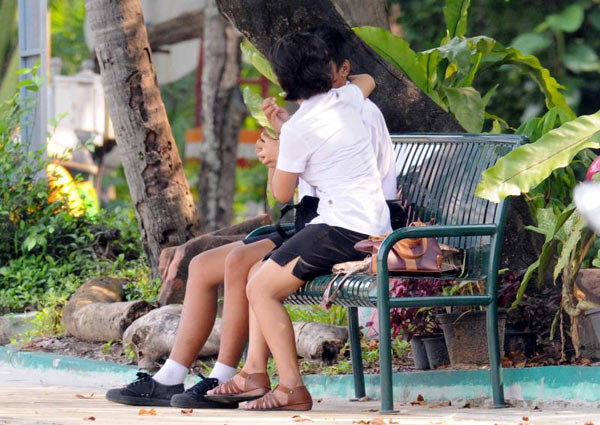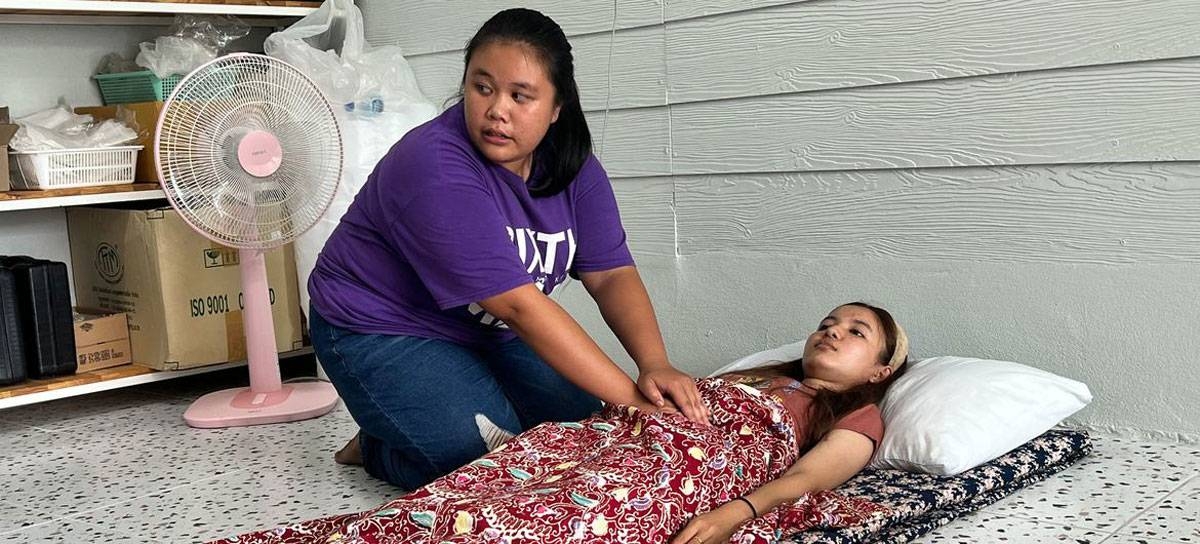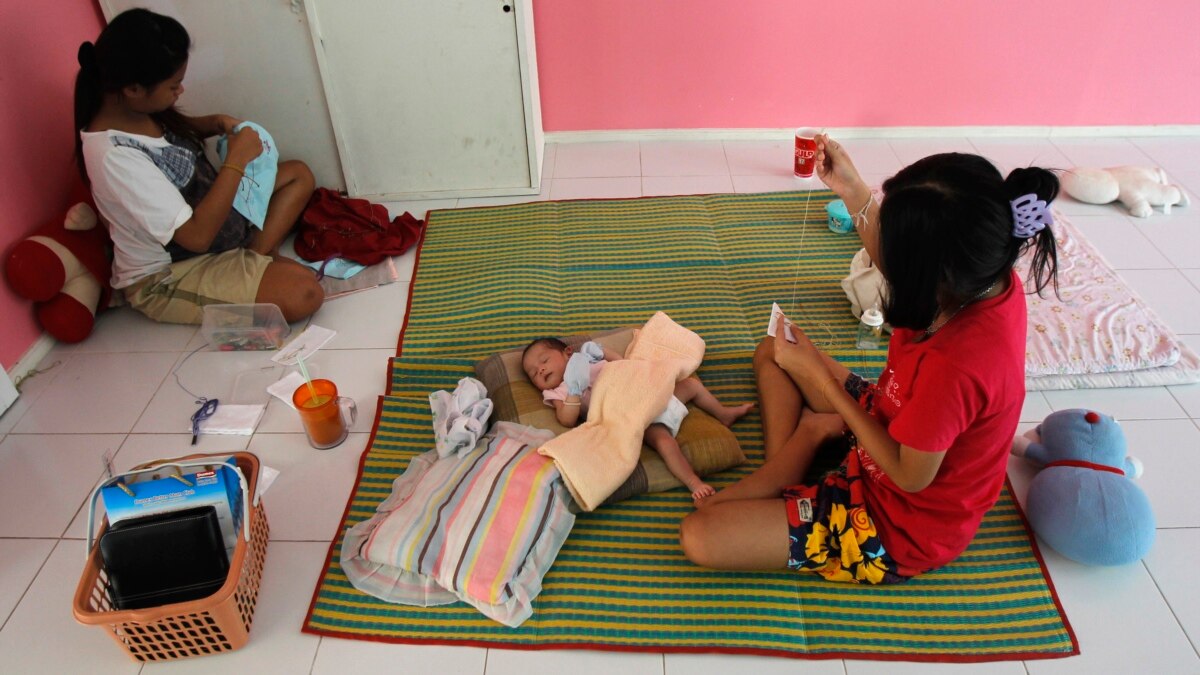Health
UN Helps Battle the Stigmatization of Teen Pregnancy in Thailand

According to the United Nations Population Fund (UNFPA), teen pregnancy is a major problem in Thailand, with a variety of factors contributing to its frequency. These factors include inadequate access to comprehensive sex education, cultural attitudes towards sexuality and contraception, and many young people’s socioeconomic challenges.
The Thai government and numerous organisations have been working to reduce teen pregnancy through projects that aim to raise sexual and reproductive health awareness, provide access to contraception, and improve sex education in schools.
However, progress has differed across the country.
Taling to Aorn, who is now 21 years old but appears much younger, is one of an estimated 47,400 teenagers aged 15 to 19 who give birth in Thailand each year, and one of many who have endured discrimination and stigma.
She was just 14 years old when she became pregnant as a result of her and her boyfriend’s failure to utilise contraception. The boy’s parents were encouraging, and the two families met to discuss how to handle the pregnancy.
Although Aorn was excited about giving birth, her mother was concerned that she would be stigmatized as a young parent and would be forced to drop out of school.
Her mother convinced her to drink a herbal drink that would induce abortion, but it did not work. Despite her failed abortion attempt, her baby, One, was born healthy and whole.
“I was so relieved when he was born healthy, and I have no regrets,” said Aorn to UN News. “I’m so happy to have him in my life.”
While his mother receives attention, the active and inquisitive One draws with crayons attentively.
Aorn’s mother was correct in her forecast that her daughter would drop out of school, as is the case for many young mothers from low-income families.
She was eventually put in touch with Khon Wai Sai, a tiny non-governmental organisation (NGO) in her birthplace, just outside the regional capital of Chiang Mai in northern Thailand.
The initiative, which is supported by the UN Population Fund (UNFPA), provides teen moms with services, guidance, and small cash incentives for tiny start-up companies. One of these grants assisted Aorn in realising her ambition of founding a coffee business.
She now gives guidance to other young women who could benefit from her experience as a peer educator during Khon Wai Sai’s regular gatherings.
“I tell young women, particularly those from rural areas who don’t have access to information about their options, such as birth control,” she said.
“Many people do not have that information. “I was aware of birth control but chose not to use it, so what I really needed from Khon Wai Sai was financial assistance to start a small business,” she added.
The woman massaging Aorn is a teen mother herself. Nan gave birth at the age of 16, and her daughter is now nearly four years old.
She, too, sought counsel and help from Khon Wai Sai and was eventually promoted to staff.
“At my school, they didn’t talk about sexual activity,” she explained. “Teachers told us that we were too young to understand reproductive health.” When I went to the health centre to get a condom, they told me the same thing. People only wanted to talk about me.”
Nan is now active in side hustles to supplement her income. She composts food waste and is a master at growing earthworms. She also prepares Dok Jok, a deep-fried bread product in the shape of a flower “that is primarily popular with older people,” at the Khon Wai Sai facility.
Despite the difficulties these two women had in getting excellent guidance, Thailand has worked hard to guarantee that all Thais, including children, have the right to and access to sexual and reproductive health care.
The universal health coverage system, which is open to all citizens, offers family planning services as well as access to a variety of birth control alternatives, such as contraceptive tablets, long-acting contraception implants, and up to ten free condoms per week to every young Thai person.
Legislation passed in 2016 to protect the right to adequate assistance and, ultimately, to minimise adolescent pregnancy has also been successful. Five years following the law’s introduction, the teen pregnancy rate among 15- to 19-year-olds was cut in half, from a high of 53.4 births per 1,000 in 2011 to 24.4 births. The goal is now to exceed the original goal of less than 15 births per 1,000 women.
While Thailand is a regional leader in sexual and reproductive health due to its progressive legal framework and commitment to providing care, healthcare providers do not always follow the letter of the law, and many teen mothers continue to struggle to access the care they require, according to Aemmy, the Khon Wai Sai coordinator.
Because the legislation is new, she claims that many healthcare providers, particularly those in government facilities, “still have a negative perspective or attitude towards teenage parents despite the law stating that denying their rights is illegal.”
Speaking ahead of International Youth Day, which is observed annually on August 12, she stated that more work is needed to guarantee that young women are not refused services.
“It is the government’s responsibility to enforce the law as well as to ensure that health-care providers receive proper training.”
Discrimination and stigmatisation of pregnant teenagers remain major societal hurdles to their access to treatment, but there are additional issues, according to Asa Torkelsson, UNFPA Country Director for Thailand.
Gender inequality, poverty, sexual assault and coercion, social pressures, exclusion from educational and job chances, and bad views towards girls are among them, she claims.
Working with the government, UNFPA has formed new alliances, including with corporations, to promote what Ms. Torkelsson refers to as “a more holistic approach to supporting girls’ rights and empowering them to avoid adolescent pregnancy.”
This approach entails age-appropriate comprehensive sexuality education for all young people, the creation of “gender-equitable societies by empowering girls and engaging men and boys,” as well as “measures to ensure adolescents’ access to sexual and reproductive health information as well as services that welcome and facilitate their choices,” she explained.
Back at the Khon Wai Sai centre, One has completed his drawing and is ready to eat lunch with his mother, while Nan prepares another batch of Dok Jok.
Both young ladies were eventually able to obtain the services they required, and they are determined to ensuring that people who come after them may do the same.
UNFPA Thailand, in collaboration with Reckitt, is funding the Khon Wai Sai initiative under the multi-year ‘Empowering our Youth initiative’, which runs from 2022 to 2026.
It aims to end unmet family planning needs and promote access to sexual and reproductive health services and rights among vulnerable and young ethnic people in Thailand’s north.
Students in Thailand Develop Board Game that Helps Tackle Teen Pregnancy
Students in Thailand Develop Board Game that Helps Tackle Teen Pregnancy




























